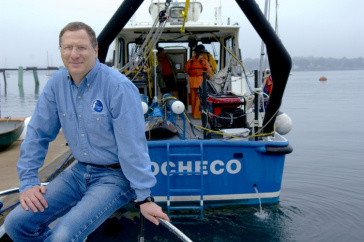The University of New Hampshire is a flagship research university that inspires innovation and transforms lives in our state, nation and world. More than 16,000 students from all 50 states and 71 countries engage with an award-winning faculty in top ranked programs in business, engineering, law, health and human services, liberal arts and the sciences across more than 200 programs of study. UNH’s research portfolio includes partnerships with NASA, NOAA, NSF and NIH, receiving more than $100 million in competitive external funding every year to further explore and define the frontiers of land, sea and space.
UNH Professor Elected to Royal Swedish Academy of Sciences

The Royal Swedish Academy of Sciences has elected ocean mapping pioneer Larry Mayer, director of the Center for Coastal and Ocean Mapping at the University of New Hampshire, as a foreign member.
Photo credit: Lisa Nugent/ UNH
DURHAM, N.H.—The Royal Swedish Academy of Sciences has elected ocean mapping pioneer Larry Mayer, director of the Center for Coastal and Ocean Mapping at the University of New Hampshire, as a foreign member. Mayer is among 175 foreign members of the academy, best known for granting the Nobel Prize.
Mayer’s career in ocean sciences and seafloor mapping has earned him numerous awards and honors over the years, and he says he is deeply honored to serve as a foreign member of the academy.
“Ocean science is rarely a solitary endeavor and success only comes through great collaborations and great collaborators,” said Mayer. “This is truly a tribute to the great work of the many people that I have had the privilege to work with over the years.”
This lifetime appointment, beginning in early 2019, recognizes successful achievements in research or services to science. Mayer will serve within the academy’s class for geosciences, one of 10 subject categories that represent members’ scientific expertise.
“This is a wonderful and justly deserved honor for Larry, who has led UNH to its worldwide prominence in ocean mapping,” said Jan Nisbet, senior vice provost for research at UNH. “His scholarship has greatly increased our understanding of the world’s oceans, and his mentorship of students from around the globe has extended this knowledge and created a worldwide network of bathymetry scholars and practitioners.”
The Royal Swedish Academy of Sciences was founded in 1739 to “promote the sciences and strengthen their influence on society.” As an independent, nongovernmental organization headquartered in Stockholm, its members meet throughout the year and make decisions regarding the awarding of scholarships, fellowships, and prizes including the prominent Nobel and Crafoord prizes.
“I am delighted for Larry but not surprised by this remarkable honor, as his research is truly world class,” says Harlan Spence, director for the UNH Institute for the Study of Earth, Oceans, and Space. “Through his election as a Fellow of the U.S. National Academy of Engineering in early 2018, he received the very highest and extremely rarest of national honors. And now, his election to the Royal Swedish Academy of Sciences catapults Larry into the rarest of rare international levels, a recognition he richly deserves.”
Latest News
-
June 18, 2024
-
June 18, 2024
-
May 17, 2024
-
May 14, 2024
-
May 7, 2024

















































